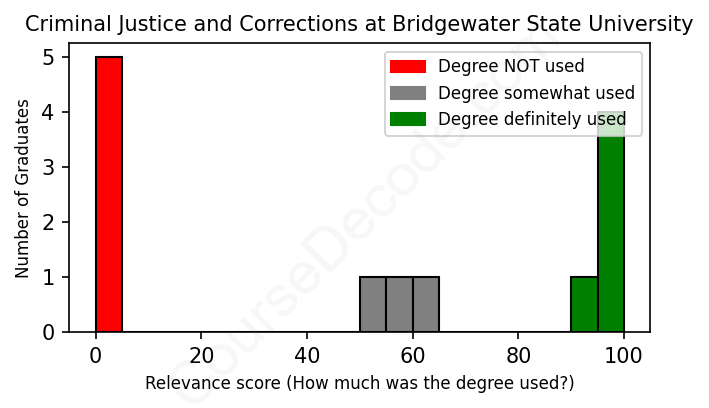
First, some facts. Of the Criminal Justice and Corrections graduates from Bridgewater State University we've analyzed , here's how many have used (or NOT used) their degree in their career:

These are estimates based on AI analysis of 13 LinkedIn profiles (see below).
The verdict? Significantly below average. Overall, with an average relevance score of 50%, Criminal Justice and Corrections graduates from Bridgewater State University have a much lower likelihood (-17%) of finding work in this field compared to the average graduate across all fields:
And for comparison, here's the chart for all profiles we've looked at across all degrees.
Also, after graduating, only 15% of these graduates have pursued further education other than another Bachelor's degree (such as a Masters degree or other), compared to the average across all profiles of 35%. This suggests a Bachelors degree is enough for most Criminal Justice and Corrections graduates, and it's normal to look for work straight after graduation.
See the details:
|
Relevance score: 55% We think this person has gone into a career only somewhat relevant to their degree. We think this person has gone into a career only somewhat relevant to their degree.
DEGREE INFOGraduated in 2019 from Bridgewater State University with a Bachelor's degree in Criminal Justice and Corrections. No other secondary education since. JOB HISTORY SINCE GRADUATIONInternship Brockton District Court Jan 2019 - Aug 2019 Ongoing Social Worker  Department of Children & Families Oct 2019 - Present ABOUTNo information provided. |
The top 10 most common jobs done by the graduates we've analyzed (ranked most common to least) are:
After looking at the jobs held by graduates of the Criminal Justice and Corrections program at Bridgewater State University, it’s clear that there’s a mix of relevant and non-relevant positions. The most common and relevant roles seem to be Correctional Program Officers and Juvenile Officers, where graduates use their knowledge directly in dealing with criminal justice issues and the legal system. Positions in court systems, like internships and probation roles, also share this relevance, allowing students to apply what they’ve learned in a real-world setting. These roles are pretty solid options for anyone looking to work in the criminal justice field.
On the other hand, many graduates ended up in jobs that have little to do with their degree. For example, roles like Assistant Football Coach, Security Guard, and even positions in retail and landscaping don’t really utilize the skills majoring in Criminal Justice and Corrections would typically involve. So while there are some great career paths directly tied to their studies, a good number of graduates seem to have gone in different directions, taking on jobs that don’t require that specialized knowledge. Overall, it's a bit of a mixed bag, but the most relevant roles definitely stand out as solid options for building a career in criminal justice.
Here is a visual representation of the most common words in job titles for Criminal Justice and Corrections graduates (this is across all Criminal Justice and Corrections graduates we've analyzed, not just those who went to Bridgewater State University):

Looking at the career trajectories of students who graduated from Bridgewater State University with a degree in Criminal Justice and Corrections, it seems like many of them have landed in fields that are relatively aligned with their studies, especially within local and state government roles. For their first jobs after graduating, many of them often take entry-level positions like security personnel, probation officer internships, or roles within juvenile and correctional facilities. For instance, graduates from 2010 and 2015 started off in security or probation-related roles, which makes sense given their education. It shows that they were at least able to find jobs that are somewhat related to criminal justice right after school.
As time goes on—looking at their trajectories about 5 to 10 years later—it seems like some graduates have climbed the ranks within their respective fields. For example, the former juvenile officer moved up to significant roles in the Massachusetts Department of Youth Services over the years. Other graduates transitioned into various positions in security and corrections, suggesting that those who stuck with the field have generally found opportunities for growth. However, it’s also clear that not everyone has remained tightly connected to criminal justice. Some have wandered into unrelated fields, such as landscaping or coaching, often taking a few detours before settling into more relevant careers. Overall, while there’s a good number of graduates who’ve pursued solid careers in criminal justice, there are others whose paths have strayed a bit, which is pretty common and just part of the career journey for many.
Getting a Bachelor's degree in Criminal Justice and Corrections at Bridgewater State University is generally considered to be on the easier side compared to some other majors. While it still requires commitment, studying topics related to law enforcement, the legal system, and social issues can be pretty engaging, making it less daunting for many students. There are challenging classes, of course, especially if you're diving deep into theories or writing research papers, but overall, if you stay organized and dedicated, you’ll likely find it manageable. Plus, a lot of the material can be really interesting and relatable, so it often feels less like a slog and more like learning about the world around you!
Most commonly, in the LinkedIn profiles we've looked at, it takes people 4 years to finish a Bachelor degree in Criminal Justice and Corrections.
When looking at these graduates from Bridgewater State University, it seems like their earnings can vary widely depending on the job and the field they went into. For instance, the folks who went into law enforcement or corrections, like the Juvenile Officer and the Correctional Program Officers, likely have decent salaries since those positions usually pay better than entry-level roles. However, some of the earlier jobs, like security guard or coaching, might not have brought in much cash, especially at entry level. The more recent graduates, particularly in roles at TeamOps and in security leadership, seem to be climbing the ladder and could be making a good income now. Overall, while some have found solid-paying jobs, others seem to have started lower on the pay scale but might have room to grow in the future.
Here is a visual representation of the most common words seen in the "about" section of LinkedIn profiles who have a Bachelor degree in Criminal Justice and Corrections (this is across all Criminal Justice and Corrections graduates we've analyzed, not just those who went to Bridgewater State University). This may or may not be useful:

Here are all colleges offering a Bachelor degree in Criminal Justice and Corrections (ordered by the average relevance score of their Criminal Justice and Corrections graduates, best to worst) where we have analyzed at least 10 of their graduates:
| College | Score | Count |
|---|---|---|
 American Military University American Military University
|
52 | 13 |
 Bridgewater State University Bridgewater State University
|
50 | 13 |
 University of Central Florida University of Central Florida
|
47 | 14 |
 University of North Texas University of North Texas
|
47 | 14 |
 University of Phoenix University of Phoenix
|
41 | 23 |
 University of Cincinnati University of Cincinnati
|
41 | 12 |
 Sam Houston State University Sam Houston State University
|
35 | 22 |
 John Jay College (CUNY) John Jay College (CUNY)
|
35 | 12 |
 Ferris State University Ferris State University
|
34 | 14 |
 Florida International University Florida International University
|
31 | 17 |
 Liberty University Liberty University
|
31 | 10 |
 California State University-Sacramento California State University-Sacramento
|
24 | 14 |
 Colorado Technical University Colorado Technical University
|
24 | 16 |